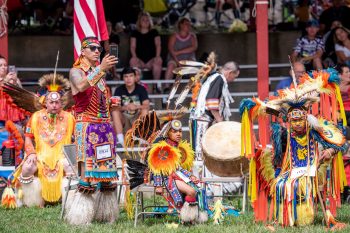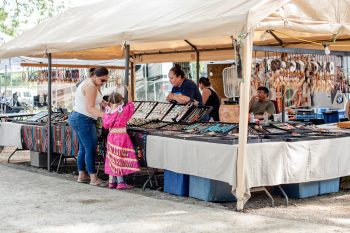 By Brenda Blackhawk
By Brenda Blackhawk
Every year, on the last weekend of July, my family travels down to Winnebago, Nebraska, for the annual Homecoming Pow Wow. I’ve recently returned from this 153-year-old Pow Wow, which is a celebration of the return of Chief Little Priest, the last great war chief of the Winnebago (or Ho-Chunk).
Pow Wows have lots of parts. There are drum and dance competitions, a wilderness run, traditional (and fusion!) food stands, and vendors selling goods. And a lot more.
As I stood in the bleachers around the perimeter of the arena, I viewed so much tradition. Don’t get me wrong, we definitely enjoyed the modern conveniences of a sound system, Wi-Fi, and an air conditioned camper instead of tent or tepee. And I saw just as many kids playing on their parents’ cell phones as I do here in the Twin Cities. 
“Generosity embodied by traditional indigenous, tribal cultures is a stark contrast to the world we live in today.”
But Pow Wow has so many beautiful pieces of tradition woven throughout the entire event. This is one of the only places in the world where you can hear Ho-Chunk being spoken and sung. You can see graceful women perform the Swan Dance and the men dancing a very entertaining Fish Dance. There are shared meals, the laying down of tobacco, and lots of prayer. And then there are the Giveaways.
Giveaways are a traditional part of tribal life for many indigenous communities. The general idea is that you give away your possessions to others in honor of a loved one. In many tribal societies, leaders were identified by who successfully accumulated possessions and gave them away. Generous individuals, not the greedy, had the most honor and prestige.
A Giveaway during Pow Wow is a whole process! First, you hear a speech from the giver(s). Then, one of the drum groups plays an honor song and there is a line of handshaking and dancing around the arena, during which time the giver(s) lay huge bundles around the arena. These bundles contain a wide variety of items: cooking utensils, toys, blankets, accessories, food, clothing, candy, and even money. The giver invites specific groups (often veterans/families of veterans or children) to come forward and take something, and then open it up to everyone.
LAST SUNDAY’S COMMON LECTIONARY reading is known as the Parable of the Rich Fool (Luke 12: 13-21). In the story, a rich man who hoards his wealth is told by God that he is a fool for doing so, which to me sounds like criticism for those hoarding wealth instead of being generous with it.
As I read that story at staff devotions, I couldn’t help but think about the way that generosity is embodied by traditional indigenous, tribal cultures; how every year I sit and watch it happen at the Homecoming Pow Wow. It is a stark contrast to the world we live in today, where, according to the Oxfam International report, the top 26 billionaires of the world own more wealth than the 3.8 billion poorest people.
“Generous individuals, not the greedy, had the most honor and prestige.”
All peoples are Indigenous to somewhere and Indigenous, tribal cultures all share one common thing: community as a means of survival. We may live in a global community now, but I don’t think God sees the arbitrary lines we’ve drawn across the Creation. If that is so, maybe it is time for all of us to connect to our Indigenous roots, generously sharing what we have for the sake of the world.
